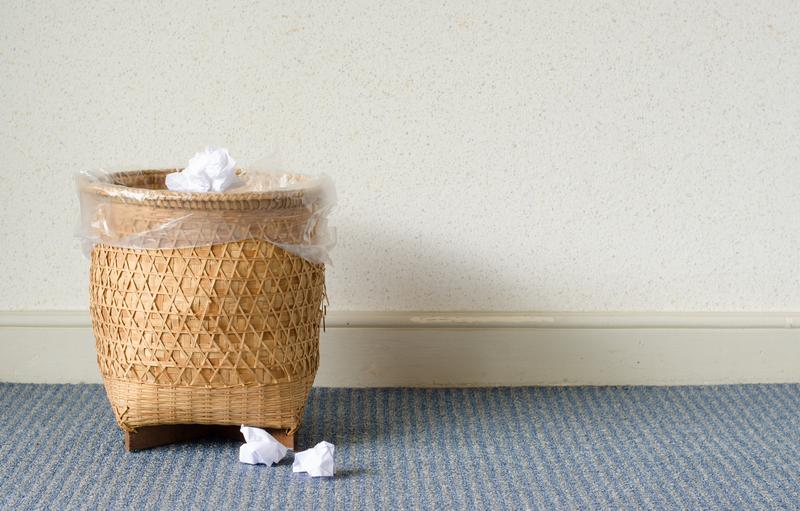Dealing with Extra Home Waste
Posted on 05/06/2025
Organic Waste: This includes kitchen scraps, yard trimmings, and other biodegradable materials. These can be composted to reduce the volume of waste going to landfill.
Recyclable Waste: Items like paper, cardboard, glass, and certain plastics fall under this category. Proper segregation and disposal can ensure these materials are recycled and repurposed.
Electronic Waste (E-Waste): Old gadgets, appliances, and electronics make up e-waste. These need special handling due to the presence of hazardous materials like lead and mercury.
Non-Recyclable Waste: This includes items that cannot be easily recycled or composted, such as certain plastics, styrofoam, and construction debris.
Reducing Waste at the Source
One of the most effective ways to deal with extra home waste is to reduce it at the source. Here are some sustainable practices:
Buy in Bulk: Purchasing products in bulk reduces the amount of packaging waste. It is also more economical in the long run.
Choose Reusable Products: Opt for reusable over disposable items. This includes using cloth bags, stainless steel water bottles, and washable cleaning cloths.
Repair Instead of Replace: Before discarding items like electronics or furniture, consider repairing them. This not only saves money but also reduces waste.
Mindful Consumption: Avoid impulse purchases and buy only what you need. This helps in reducing waste generated from packaging and unused products.

Recycling and Composting: Key Solutions
Recycling and composting are crucial in dealing with extra home waste effectively. Understanding and implementing these methods can significantly reduce the waste that ends up in landfills:
Segregate Waste: Have separate bins for recyclable, organic, and non-recyclable waste. This makes it easier to dispose of waste correctly.
Local Recycling Programs: Participate in local recycling programs. Many communities have curbside pickup or drop-off points for recyclables.
Composting: Composting organic waste is an excellent way to return nutrients to the soil. You can compost kitchen scraps, yard waste, and even biodegradable paper.
Recycling Electronics: E-waste recycling centers safely dispose of and recycle old electronics. Avoid throwing e-waste in regular trash to prevent environmental contamination.
Waste Disposal Services
If managing extra home waste becomes overwhelming, consider using professional waste disposal services. These services offer several benefits, including:
Convenience: Professional services handle the sorting, recycling, and disposal of waste, saving you time and effort.
Efficiency: These services use advanced methods to manage waste, ensuring that recyclable materials are processed correctly and non-recyclables are disposed of safely.
Environmentally Friendly: Licensed waste disposal companies follow regulations and guidelines to minimize environmental impact.
Specialty Services: For bulky items like furniture or hazardous materials like old paint cans, these services offer specialized disposal options.
Innovative Waste Management Solutions
Innovative solutions and new technologies are continually emerging to improve waste management. Here's a look at some cutting-edge approaches:
Smart Bins: These bins use sensors to detect waste levels and can automatically sort waste into recyclable and non-recyclable categories.
Waste-to-Energy: Advanced technologies convert waste into energy, providing a renewable energy source while reducing landfill volume.
Biodegradable Materials: The development and use of biodegradable materials for packaging and products can significantly reduce the amount of non-recyclable waste.
Community Initiatives: Start or join community initiatives focused on waste reduction, recycling drives, and educational programs. Collective efforts can lead to more significant impacts.

Educational Resources and Community Involvement
Education and community involvement play critical roles in effective waste management. Here are some ways to increase awareness and participation:
Workshops and Seminars: Attend workshops and seminars on waste reduction, composting, and recycling. Community centers and local governments often offer these resources.
School Programs: Encourage schools to include environmental education in their curriculum. Educating children on waste management can foster lifelong sustainable habits.
Online Resources: Numerous websites and online courses provide valuable information and tips on managing household waste effectively.
Community Groups: Join or form community groups focused on waste management. Sharing knowledge and resources can help in developing more effective waste management strategies.
Conclusion
Dealing with extra home waste requires a multifaceted approach, involving reduction at the source, recycling, composting, and proper disposal methods. By understanding the different types of waste and leveraging available resources and technologies, households can significantly minimize their waste footprint. Active participation in local waste management programs and educating oneself and others about sustainable practices are crucial steps toward a more environmentally friendly and sustainable future.
















